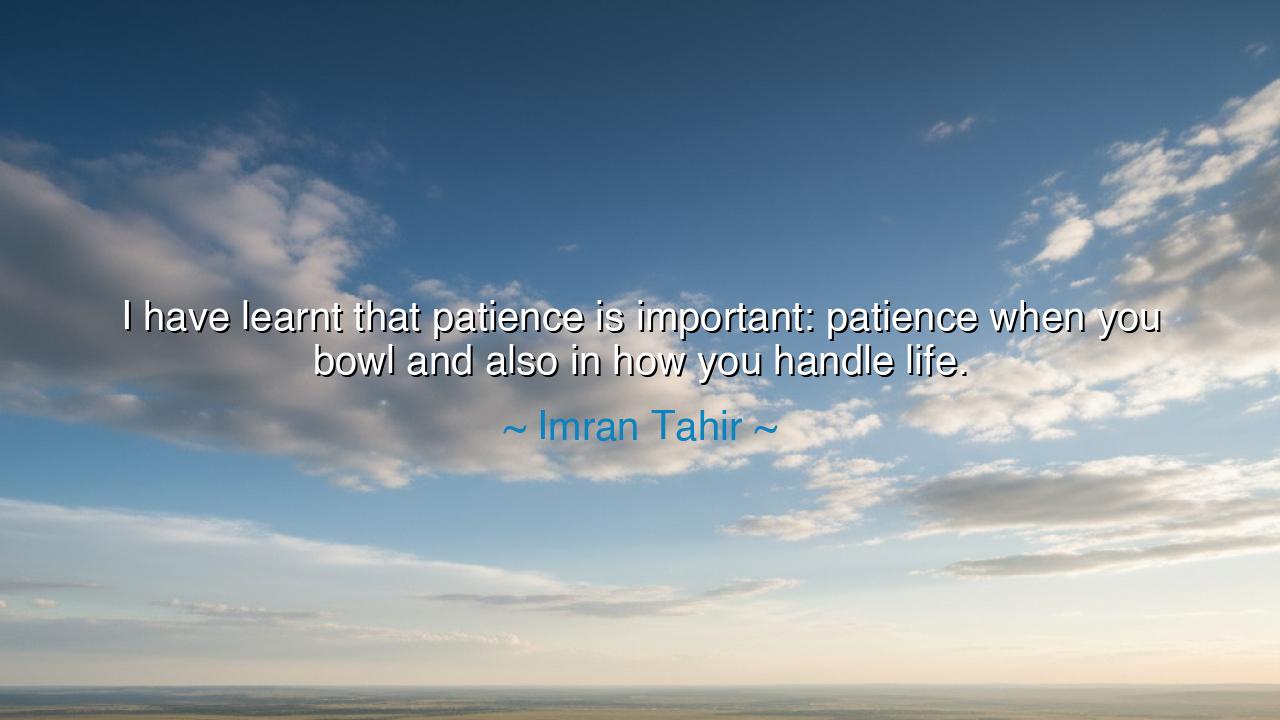
I have learnt that patience is important: patience when you bowl
I have learnt that patience is important: patience when you bowl and also in how you handle life.






Hear, O seekers of wisdom, the humble yet powerful teaching of Imran Tahir, who declared: “I have learnt that patience is important: patience when you bowl and also in how you handle life.” These words, though spoken in the language of sport, echo with the voice of eternity. For in them lies a truth known to the ancients: that the measure of greatness is not in sudden triumph, but in the endurance of the spirit, in the steady heart that does not falter when tested.
When the bowler takes his run to deliver the ball, he must summon more than strength or skill. He must summon patience. The batsman may resist, the runs may come slowly, the breakthrough may delay. Yet the bowler who endures, who adjusts, who waits for the right moment, is the one who finally conquers. So it is with life: we throw ourselves into the world with hope, but its answers come slowly, and its victories are often hidden behind seasons of waiting. The hasty heart is broken; the patient heart prevails.
Consider, O listeners, the journey of Tahir himself. Born in Pakistan, his early years were marked not by immediate glory, but by long struggle. He wandered from team to team, country to country, seeking opportunity. Lesser men would have abandoned the path, claiming fate had cheated them. But through patience, he endured. At last, in South Africa, he found his home, and became one of the world’s most celebrated spin bowlers. His life itself testifies that patience, though hard, is the gateway to destiny.
The ancients, too, bore witness to this truth. Did not the farmer, sowing his seed, learn to wait through storms and drought until the harvest came? Did not Odysseus wander ten long years across the sea, suffering trial upon trial, before his patience restored him to hearth and home? Always the lesson resounds: that nothing worth keeping is won in haste. Patience is the companion of wisdom, and the mother of lasting triumph.
Let us also remember that patience is not weakness. It is not the resignation of the defeated, but the strength of restraint. The bowler who waits is not idle—he is observing, planning, preparing for the right ball that will shatter the stumps. The man or woman who waits in life is not stagnant—they are ripening, gathering the wisdom and resilience needed for their true moment. To endure with patience is to walk in quiet power, while those who rush burn themselves out like sparks in the wind.
The lesson, then, is clear: whether you face the pitch of cricket or the pitch of life, clothe yourself in patience. Do not curse the delays, nor abandon the journey when the fruit seems distant. Instead, trust the rhythm of time, for even the longest night yields to dawn, and even the driest season is followed by rain. Make patience your companion, and you will walk further than the hasty ever dream.
Practical actions flow from this truth. In your daily battles, pause before anger rises; in your labors, endure before despair takes root. When your goals seem distant, remind yourself that all great things ripen slowly: the tree grows year by year, the craftsman perfects his skill through repetition, the bowler secures his wicket after many deliveries. Cultivate patience in your speech, in your relationships, in your ambitions. In doing so, you will master not only the field of play, but the greater field of life.
Thus do we honor the words of Imran Tahir: that patience, whether in bowling or in living, is no small virtue but the very key to endurance and greatness. Carry this teaching, O children of tomorrow, and let your lives be steady and enduring, like the bowler who does not despair after each ball, but who trusts that, in the fullness of time, the wicket will fall.






AAdministratorAdministrator
Welcome, honored guests. Please leave a comment, we will respond soon